In response to some families recently leaving his Reformed (CREC) church for the Orthodox Church, Pastor Toby Sumpter recently wrote “The Levite Club.” In the article he uses strong language to dissuade them from leaving Reformed Christianity for Orthodoxy.
His main argument is that to leave the Reformed church for Orthodoxy is an act of schism. That is, it will bring division to the body of Christ. Coming from a new Reformed denominational spin-off founded in 1998, this accusation is rich in irony. I don’t think Pastor Sumpter is advocating the invisible church model so popular among Evangelicals but something closer to the Anglican branch theory of the church. This is the doctrine that there is one Church with several branches: Roman Catholic, Reformed Protestant, and Eastern Orthodox. This is a relatively new doctrine that arose in Anglicanism several centuries after the Protestant Reformation in the mid-1800s and has no ancient precedent.
According to the branch theory while church divisions are regrettable, they are transitory in nature and will in time be overcome with church unity once again restored. I infer this from Pastor Sumpter’s subsequent blog posting which contains a lengthy excerpt from Philip Schaff’s “Principle of Protestantism.” In light of the branch theory of the church it is understandable that Pastor Sumpter would view with alarm parishioners leaving Reformed Protestantism for Orthodoxy.
Does Galatians 2 Apply?
Pastor Sumpter brings up Galatians 2 to bolster his argument that leaving the Reformed church is wrong. He sees parallels between the present situation and the conflict between the Apostles Peter and Paul in Antioch.
You can’t convert and act like you aren’t making a drastic statement about them. How is going from sharing the body and blood of Christ with them to being forbidden to becoming more catholic? You are going from loving Christ in the brothers and sisters right in front of you to getting cozy with strangers. This is why Paul withstood Peter to his face in Antioch. He was eating with some brothers and then when the Judaizers showed up, he withdrew. This is against the truth of the gospel.
Pastor Sumpter, following other CREC teachers, presumes Galatians 2 somehow addresses the question who has access to the Eucharist. But in fact, in Galatians 2 Paul was rebuking Peter for refusing to partake of the common meal with Gentile converts to Christ; Eucharistic fellowship was not an issue in Galatians 2. The Greek for “eat with” in Galatians 2:12 is συνεσθιω (sunesthio). It was used for ordinary meals, not special religious festivals; see Luke 15:2, Acts 11:3, and 1 Corinthians 5:11. For Pastor Sumpter to equate the common meal with the Eucharist is a serious misreading of the biblical text. So, to apply Galatians 2 to the issue of Eucharistic fellowship today represents a lapse in logical reasoning. On the other hand to apply Galatians 2 to the present day situation — Orthodox Christians welcome the opportunity to share a common meal with their Reformed friends and family members!
For a closer parallel let us imagine that the Judaizers were Christian teachers who were at one time loyal to the Apostles then repudiated them as false teachers, broke off to start a new Christian church based on the “true” Gospel of salvation. Then we would have a situation more pertinent to the issue before us. Let us imagine that these renegades came to Antioch with their new teachings and unapologetic for their break with the Apostles, would they be admitted to the Eucharist? It is hard to imagine the Apostles Peter and Paul allowing them to partake of the Eucharist!
The problem with Pastor Sumpter’s usage of Galatians 2 goes beyond the twisting of Scripture to make it say what you want; the problem is also ignorance of church history. Trinitarian baptism never guaranteed someone Eucharistic fellowship any more than Circumcision guaranteed access to the Jewish Temple. Both the Jew of the Old Covenant and the Christian of the New Covenant could become unclean and forfeit his sacramental privileges. Historically, admission to the Eucharist was premised on being in submission to the ruling Bishop at the time, not merely Baptism. In the early Church it was the Bishop who taught new converts the Gospel. Thus, to be baptized in the early Church meant coming under the authority of the Bishop, likewise to receive the Eucharist meant that one was in unity with the Bishop who was in Eucharistic unity with other bishops around the world, that is, the Church Catholic. To be excommunicated by your Bishop meant being out of fellowship not only with the local Christian fellowship but the universal Church as well.
The amazing thing is that the CREC pastors want to repudiate the historic Church, Her Bishops, and Her Sacraments, then claim the right to celebrate Her Sacraments in their own way. It is astonishing that Pastor Sumpter would call the historic Orthodox Church “divisive” and/or “schismatic” if She does not follow the CREC theology and ecclesiology! It would make as much sense as Canadian football players demanding admission to the NFL Hall of Fame or else the NFL would be divisive or exclusionary! Let us recognize and respect the fact that different games have different rules one must play by. Different game rules call for different playing fields, or else we will end up with multiple players on the same playing field playing according their own interpretations of the rule book with no referees to enforce the rules. If a football player wishes to play in the NFL games, he must play according NFL rules not according his own interpretation.
Where is the True Church?
Pastor Toby Sumpter’s beef with Orthodoxy lies in their refusal to recognize Protestant sacraments as equally valid as the Holy Mysteries received in the Orthodox Divine Liturgy. He wrote in a comment thread:
I may request that a person be baptized before coming to the table at Trinity, but I do not thereby insist that if any other church does it differently than me, they are therefore not a true church and their sacraments invalid. Rome and Orthodoxy are sectarian by their refusal to acknowledge the fullness of the Triune God in the sacraments and government of other historic Christian bodies. [Emphasis added.]
What he is saying here is: Hey! We’re just as much a church as the Orthodox Church is a church. This is based on the assumption that Protestantism is part of the “one holy catholic and apostolic Church” confessed in the Nicene Creed. But this raises several questions: What is the Church historically? More importantly, what has been the basis for church unity? Is the church just any group of people who gather to hear sermons from the Bible, formulate new doctrines and confessions, create their own Bishops and Sacraments? Does church history teach or allow for modern ecclesiastical entrepreneurialism that give rise to new startup churches, new teachings, and alternative Christianities?
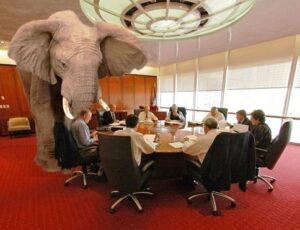 Historically, the Christian community gathered on Sunday to celebrate the Eucharist around the Apostles and then later their successors, the Bishops. There is simply no way the office of the Bishop can be honestly read out of the historic Church of the first fifteen centuries. It is possible that the trauma of the break from Rome created a historical amnesia in Protestant theology. Recently, there has appeared in Protestantism a desire to recover and incorporate some historic forms of worship. This has resulted in Reformed churches celebrating Holy Communion on a weekly basis. Some have gone so far as to discard the “just-a-symbol” understanding of the Lord’s Supper for the historic understanding of the Real-Presence of Christ’s body and blood in the Eucharist. These steps are all commendable. Yet there remains one important element missing — perhaps the elephant in the room – that is the episcopacy or the office of the Bishop.
Historically, the Christian community gathered on Sunday to celebrate the Eucharist around the Apostles and then later their successors, the Bishops. There is simply no way the office of the Bishop can be honestly read out of the historic Church of the first fifteen centuries. It is possible that the trauma of the break from Rome created a historical amnesia in Protestant theology. Recently, there has appeared in Protestantism a desire to recover and incorporate some historic forms of worship. This has resulted in Reformed churches celebrating Holy Communion on a weekly basis. Some have gone so far as to discard the “just-a-symbol” understanding of the Lord’s Supper for the historic understanding of the Real-Presence of Christ’s body and blood in the Eucharist. These steps are all commendable. Yet there remains one important element missing — perhaps the elephant in the room – that is the episcopacy or the office of the Bishop.
Who’s Your Bishop?
The episcopacy or office of the bishop is critical to understanding the Church. Protestants have dismissed or overlooked the historic role Bishops played in Christianity because of the historic abuses of the Bishop(s) (Popes) of Rome, but sincere Christians cannot miss the fact of the episcopacy when reading Church history. For example, Ignatius, Bishop of Antioch (d. 98/117) wrote a series of letters that shed light on the early Church. It is important to keep in mind that he came from the Apostle Paul’s home church (see Acts 11:19-26, 13:1-3)! And it is worth noting the very venue of Galatians 2! [How early is Ignatius of Antioch? There is the story that Ignatius was among the children Jesus took into his arms and blessed (see Mark 10:13-16).] And it is important to keep in mind that he was writing not as a church historian but as Bishop on his way to his impending martyrdom. In his Letter to the Smyrnaeans he wrote:
Wheresoever the bishop shall appear, there let the people be; even as where Jesus may be, there is the universal Church. It is not lawful apart from the bishop either to baptize or to hold a love-feast; but whatsoever he shall approve, this is well-pleasing also to God; that everything which ye do may be sure and valid. [Lightfoot translation; Emphasis added.]
For early Christians, the Bishop was more than a church administrator; he was viewed as the successor to the Apostles. For this reason early Christians took care to maintain lists of apostolic succession. See Eusebius’ Church History 3.22, 3.34-36 (NPNF Vol.1, pp. 149, 166-169). It was his job to safeguard and pass down the teachings of the Apostles. It was also his job to see that the churches under him were functioning in an orderly and harmonious manner, and that the Eucharist and the sacraments were administered properly.
We must also bear in mind something rarely noted in the Protestant reading of Church history — the New Testament Scriptures were incomplete for the first four decades of church history. As a matter of fact most scholars believe all the New Testament was not finished for the first 70 years! This means there was no basis for the Protestant Sola Scriptura in the early Church! How then was the Faith transmitted to the next generations? Answer: by the Holy Tradition of the Apostles. The Apostle Paul made numerous references to Tradition; see 2 Thessalonians 2:15; 1 Thessalonians 2:13; 2 Timothy 1:13-14; 1 Corinthians 11:23. In other words, the early Christians depended on the Bishops to teach them the Apostles’ doctrines and practices (Tradition). The Apostle Paul expected successors like Bishops Timothy and Titus would faithfully pass on his teachings without change to future generations of Christians. And even when the New Testament canon was finalized in subsequent centuries the Bishops remained the official guardians of Apostolic Tradition. (There is not a single shred of historical evidence that once the New Testament canon was finalized that the Christians then shifted to Sola Scriptura. This is a Protestant presupposition that needs to be scrutinized in light of historical evidence.)
Historically, the Bishops were responsible for the safekeeping of the physical text of Scripture as well as its right meaning. One can have the right Scripture but abuse it through a wrong interpretation of the text (heresy). In Orthodox iconography the office of the Bishop is signified by the saint holding the Gospel book, a sign of his being the guardian and interpreter of Holy Scripture.
So if Ignatius of Antioch, the third Bishop of the Apostle Paul’s home church, were to walk into Trinity Reformed Church in Moscow, Idaho, (the church pastored by Pastor Toby Sumpter) he would ask: Who IS your Bishop. . . where does he live? If a congregation cannot give the name of their Bishop and his line of succession back to the original Apostles, the implications are disturbing. One, the congregation would not be considered part of the “universal Church” or “Catholic Church” according Ignatius’ letter. Two, the baptisms and Eucharistic celebrations conducted at these bishop-less congregations would lack Apostolic validity! (How would you feel if you learned your family doctor didn’t have a real M.D. degree and that the certificate on the wall was a mail order degree? Would you entrust your family’s health into the hands of a self-taught quack?!!) Please note: Orthodoxy does not assert dogmatically Protestant sacraments or churches are devoid of grace. Indeed, Metropolitan Kallistos Ware grants there are “measures of the grace of God” in other Christian communions. See The Orthodox Church pp. 307-311. What IS held is that, in openly rejecting the Orthodox Church of history, one rejects the fullness of historic Orthodoxy. One cannot repudiate much that is central to the historic Church (on the one hand), then turn around and claim the same status and privileges of the very Church one has just repudiated!
In other words, Saint Ignatius of Antioch effectively undercuts the basis for Pastor Toby Sumpter’s branch theory of the church! A bishop-less church is like a general cut off from the chain of command! Could a loyal soldier in good conscience obey the order of a renegade general? This leaves a Reformed Christian in search of the historic church with two choices: (1) accept the logical implications of Ignatius of Antioch’s writings and look into Orthodoxy or (2) discard Ignatius of Antioch’s writings on the basis of Sola Scriptura (the Bible alone) and embrace the Protestant understanding of the church.
Thus, Orthodoxy’s unwillingness to recognize Reformed churches as part of the one holy catholic and apostolic Church is not the result of an arbitrary sectarian outlook held by hide bound church leaders. Orthodoxy’s refusal to grant mutual recognition to Reformed churches is grounded in the teachings of the early Church. In my journey to Orthodoxy one thing that has struck me is how much of early Christianity lives on in Orthodoxy. Tradition in Orthodoxy is a living Tradition. It is something lived out day by day over many centuries. Every Sunday Orthodox churches celebrate the historic Liturgy of St. John Chrysostom or St. Basil the Great. In Orthodoxy I see the Church of the early Church Fathers like Irenaeus of Lyons, Athanasius the Great, John Chrysostom, Basil the Great, John of Damascus. For a Protestant to visit an Orthodox Liturgy is like the movie Jurassic Park where paleobiologist Alan Grant sees living breathing dinosaurs walking right before his eyes.
The Unity of the Church
If Pastor Sumpter holds to the branch theory of the church, then it behooves him to demonstrate how this particular ecclesiology does in fact promote church unity. When one looks at more recent Reformed movements like the Federal Vision or the CREC (Communion of Reformed Evangelical Churches) and their embrace of the catholicity of the church one has to wonder how they would bring about unity in an already fractured Reformed tradition, not to mention the many differences in the larger Protestant tradition.
But the unity being discussed here is a horizontal unity among the various Protestant bodies today. It is a horizontal unity in the sense that it spans the world geographically in the present moment. Another dimension to church unity is the vertical unity that links the present day church to the early Church. Can Pastor Sumpter claim unity with the early Church? Pastor Sumpter and Philip Schaff may have read the church fathers but are they in the line of historic Eucharistic Communion with a Bishop of the early church say of Saint John Chrysostom?
Let us try this thought experiment. Let’s say Toby Sumpter and Philip Schaff travelled in a time machine back to Hagia Sophia Cathedral in Constantinople in the late fourth century when John Chrysostom was giving his famous sermons. Would they be allowed to receive Communion? The answer is: No. This is based on the fact that the Patriarchate of Constantinople of today which has been in unbroken continuity with Saint John Chrysostom for centuries would deny Pastor Toby Sumpter Holy Communion now as it would then. Keep in mind that John Chrysostom is the 37th Bishop of Constantinople who served from 398 to 404, and the current Bishop is Bartholomew I who took office in 1991 is the 271st Bishop of Constantinople.
In terms of doctrine and worship the Greek Orthodox Church today is virtually identical with Saint John Chrysostom’s Church then. The question one must then ask is: Is there a discontinuity between the Greek Orthodox Church of today and the church of John Chrysostom’s time? If there is a disruption (this I believe is what Pastor Sumpter would assume), then when did the break take place? If the discontinuity is due to Protestantism’s break with Rome then the question becomes: Is the Reformed church one with Saint John Chrysostom’s church or is it a separate church?
By What Authority?
Interestingly, in addition to logic and reason, Pastor Sumpter felt the need to invoke his pastoral authority as he closes the blog article.
You are under the authority of and in communion with Jesus now through the pastors and elders who baptized you, catechized you, and serve you the Supper.
When I read this sentence I was taken aback. When I was a Protestant I never encountered such naked expression of pastoral power; not even when I was talking with my pastor about my intention to become Orthodox! This kind of strong authority is a part of Orthodoxy but even then Orthodox priests exercise it cautiously. I heard an Orthodox Priest relate instances when parishioners wanted to adopt practices or views contrary to Orthodoxy, his response to them was: “There’s the door. And you’re welcome to come back when you’re ready.” Meaning they were free to leave the Church if they held views at odds with the teachings of the Church but that he would welcome them back if they changed their mind. This open door approach is more respectful of human dignity than emotional blackmail and spiritual intimidation cloaked in “pastoral” concern.
But the more fundamental question here is: What is the basis for pastoral authority? At the Last Supper Jesus said to his disciples: “This cup is the new covenant in my blood, which is poured out for you.” (Luke 22:20) In other words with his death on the Cross Jesus inaugurated the New Covenant. This means that the Church is the New Israel. Like the Israel of the Old Covenant there was covenant order and covenant authority. Covenant authority is not something one generates by one’s self; it is conferred by a higher authority. Jesus told his disciples: “I confer on you a kingdom, just as my Father conferred one on me. . . .” (Luke 22:29) Covenant authority is conferred by Christ to his Apostles who in turned conferred it to their successors the Bishops via ordination. Inquirers into Orthodoxy today can examine the Orthodox Church’s claim to apostolic succession through the lists of successions, e.g., that of Patriarchate of Antioch or that of Constantinople. The sad thing is that the lack of Bishops means the absence of covenant authority in Reformed churches. This leads to the question: By what authority does Pastor Sumpter warn people not to convert to Orthodoxy? Lacking the covenant authority of the historic apostolic Church, Pastor Sumpter is on shaky grounds here.
Pastor Sumpter curiously uses his pastoral position with emotional family appeals for unity. One wonders if he offers the same counsel to couples and families coming to his church who are leaving historic Orthodox, Roman Catholic, or Baptist, Pentecostal, Anglican family backgrounds? Or does Pastor Sumpter’s idea of schism cut in only one direction? Regardless, this line of argumentation seems more than a tad manipulative – if not downright duplicitous.
Joining the Levite Club?
It is regrettable that Pastor Toby Sumpter has to engage in name calling in his defense of Reformed Christianity. This is more than a breach of good manners; it is also symptomatic of a weak theological position. I am reminded of this quote:
Observe which side resorts to the most vociferous name calling and you are likely to have identified the side with the weaker argument and they know it. (Charles R. Anderson) Source
Equating joining Orthodoxy with joining the “Levite club” or becoming “camel gulpers” and “gnat stranglers” is colorful polemics but not reasoned argumentation. We deserve better than that!
You can’t convert and act like you aren’t making a drastic statement about them. How is going from sharing the body and blood of Christ with them to being forbidden to becoming more catholic? You are going from loving Christ in the brothers and sisters right in front of you to getting cozy with strangers. This is why Paul withstood Peter to his face in Antioch. He was eating with some brothers and then when the Judaizers showed up, he withdrew. This is against the truth of the gospel. This is high handed hypocrisy and pharisaism. You are the Levite and the Priest on the road from Jericho to Jerusalem. You have made an idol of ceremonies and traditions, and you are training to become a professional camel gulper and gnat strangler. [Emphasis added.]
I suspect the polemic here is directed against: (1) Orthodoxy’s liturgical approach to worship and prayer and (2) Orthodoxy’s ascetic disciplines. With respect to the first target of Pastor Sumpter’s polemic (liturgical worship) all I can say he is correct in his judgment. Just as Old Testament worship and spirituality was liturgical and formal in nature so too is Orthodox worship and spirituality. I note however that Christian worship has historically been liturgical in nature and that it was not until the Protestant Reformation and especially the emergence of Puritanism that ceremonialism was stripped from Christian worship. So what’s the problem?
With respect to the second target of Pastor Sumpter’s polemic (Orthodoxy’s ascetic disciplines) I would point out that while Orthodoxy has a lot of rules about fasting and prayer, it is not legalistic. This may sound contradictory but the fact of the matter is we fast and pray for our spiritual growth, not to earn God’s favor. I learned that there are occasions when it is better for an Orthodox Christian not to fast for reasons of charity or hospitality. For example, if an Orthodox Christian visits the home of a non-Orthodox family and is offered hamburger the better thing is accept their hospitality than to rigidly keep the fast.
In Orthodox spirituality discipline is leaven with grace and mercy. There are frequent warnings about the spirit of Pharisaism. After several years of attempting to keep the fasts I’ve had to eat a lot humble pie but I don’t think I’ve become a “camel gulper.” 😉
Away with Bishops?
In a subsequent blog article — “Better Than Anointed Lords“– Pastor Sumpter posted a lengthy excerpt from Philip Schaff’s “Principle of Protestantism” which employs similar rhetorical techniques. It is evident that Schaff has a low opinion of Orthodoxy when he calls attention to the “dead Armenian and Greek denominations.” Philip Schaff’s ad hominem attack against Orthodoxy in the 1800s is no less ferocious than Pastor Sumpter’s.
No, we need something higher and better than anointed lords and consecrated gentlemen. Such aristocratic hierarchs and proud bearers of apostolic succession precisely, like the pharisees and highpriests of Judaism, have themselves again and again secularized the Church, rocking it into the sleep of lifeless formalism or religious indifference. [Emphasis added.]
Schaff’s attack on the office of the Bishop is breathtaking. Throughout church history there have been good Bishops and bad Bishops, but that is no reason to dispense with the episcopacy. There have been good Pastors and bad Pastors, but that is not reason for dispensing with the office of the Pastor! Using this same logic if there are numerous bad sermons given on Sunday morning is that reason enough to drop the sermon altogether? Is not the more reasonable solution?? More dedicated Bishops, better Pastors, and high quality sermons? We need as the Apostle Paul advised Bishop Timothy to “fan into flame the gift of God” (2 Timothy 1:6).
A Word for Hesitant Protestants
What I have tried to do in this blog article is to respond logically and calmly to Pastor Sumpter’s warnings and admonitions to Reformed Christians interested in Orthodoxy. It is understandable that someone of Pastor Sumpter’s theological convictions would express alarm over people converting to Orthodoxy. People have been crossing over for some time now from the Reformed tradition to Orthodoxy, and this tiny trickle has been growing into a noticeable stream of converts drawing the attention of concerned Reformed pastors.
In this blog article I gave reasons for becoming Orthodox, but I also recognize that some people are hesitant for relational reasons. They fear the breakup of long standing friendships and intimate family ties. These are good reasons to hesitate. Generally, the counsel by Orthodox Priests is that it is better for the husband or wife to delay their entry into the Church in order to give their spouse time to consider Orthodoxy. Orthodoxy seeks to keep marital and family ties intact. See my articles: “Family Concerns and Conversion to Orthodoxy” and “Called Together.”
For many inquirers the best approach is the “Nicodemus approach,” that is, to inquire quietly and discreetly about Orthodox Christianity. There are many excellent books and materials out there. Thanks to the Internet people can listen to Ancient Faith Radio or read the Early Church Fathers online. Another venue for quiet exploration is the Saturday evening Vespers service or visit an Orthodox Liturgy while traveling. One could even set up a one on one meeting with a local Orthodox priest. Many priests are converts to Orthodox and many of the priests who are “cradle Orthodox” have experience dealing with Protestant inquirers. And of course there’s the Contact Form on this blog and other similar blogs. 🙂
For hesitant Protestant inquirers my message to them is: “Don’t be afraid! Trust in God’s sovereignty and his great mercy.” We can’t control the times we live in but we can choose how we will live. In my blog article “Crossing the Bosphorus” I compared the different kinds of border crossings taking place today. With some families becoming Orthodox is like moving house, one loads up the truck, say your goodbyes, and move into your new home. For others becoming Orthodox will be like crossing hostile territory strung with barbed wires and guards on patrol. For these families becoming Orthodox will be much more difficult and costly. My aim here is to foster friendly dialogue and mutual respect on both sides. I believe there can be friendly dialogue between the Reformed and Orthodox traditions even as we disagree.
Can We Still be Friends?
In a recent blog posting “Evangelicals and Orthodox in Conversation” I pointed out the longstanding friendship between Pastor John Armstrong and Father Wilbur Ellsworth even as they diverged theologically. Ellsworth became Orthodox while Armstrong remained a convinced Reformed minister. [See video]
It’s more than a decade since I converted to Orthodoxy. I’m amazed that many of my friendships still carry over from my Protestant days. A few days ago I had dinner with a retired Congregationalist pastor, went to the local farmers’ market with a couple who belong to a United Methodist Church and another friend who is Roman Catholic. A few nights ago I went to a Thai food restaurant for dinner with a friend from the missions committee of my former home church and caught up with a missionary couple whom I knew from the 1980s!
Much of this camaraderie is due to the mutual respect we have for each other even as we differ theologically. Also, I emphasized the personal aspect of friendship but exercised caution when it comes to church functions. I’ve attended funerals at my former home church; and I attended their centennial anniversary but I told them I would not be attending their Sunday Services. I can’t because it would be like seeing an old girlfriend one still has feelings for. Love and commitment calls for wisdom in setting boundaries. The point I want to make is that friendships can continue even as we change church membership.
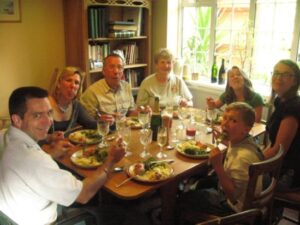
Enjoying a common meal! Source
As I wrote earlier in this blog article, Orthodox Christians welcome the opportunity to share a common meal with their Reformed friends and family members! This is the right application of Galatians 2 to the present situation. Let us not be like the early Judaizers who disinvited themselves from the common meal with Gentile fellow believers in Christ. We may not always agree theologically but we can still be friends.
Robert Arakaki

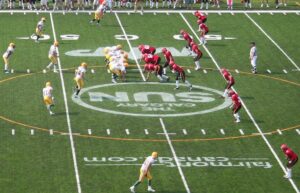
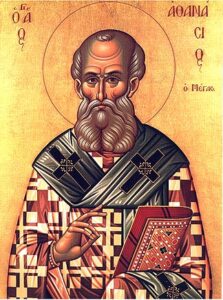
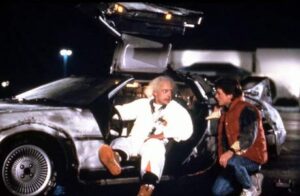

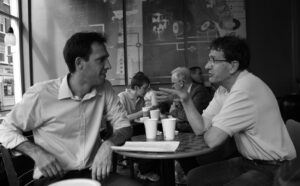
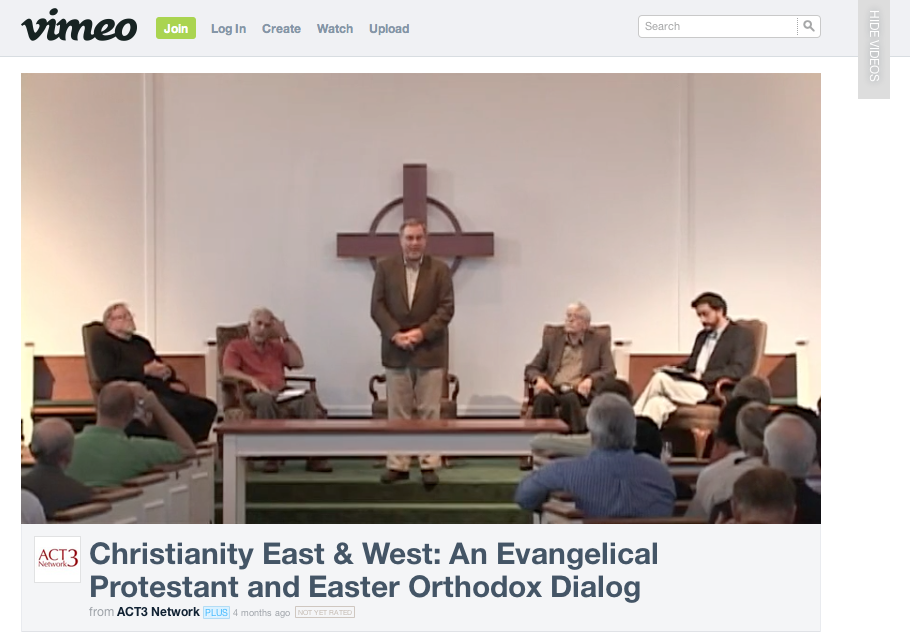
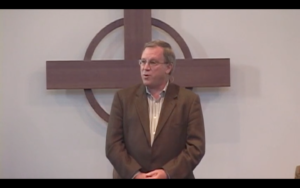
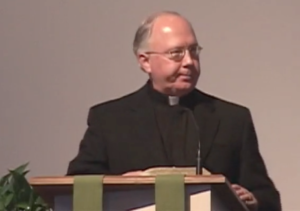
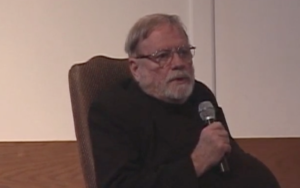
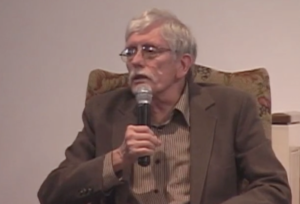
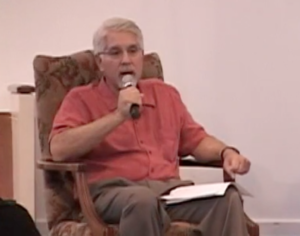
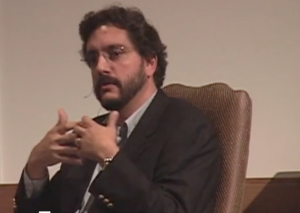
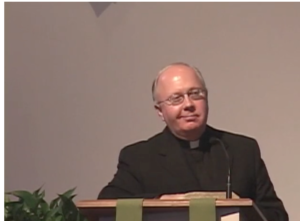
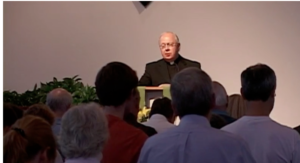
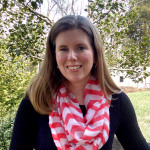
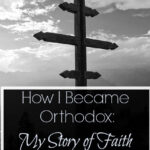
Recent Comments